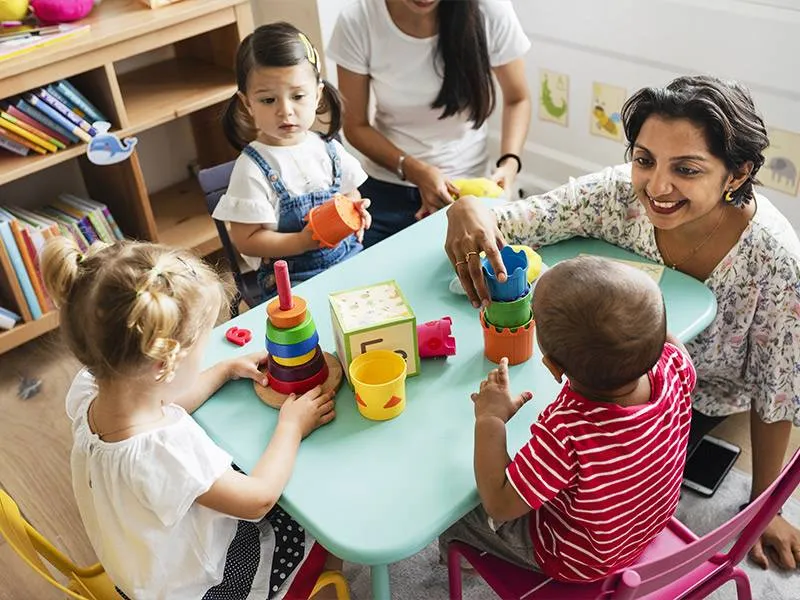Home Daycares vs Daycare centres

There are a lot of factors to consider when deciding on the best type of child care for your children, but when it comes to finding affordable, quality child care, parents ultimately come down to a decision between a commercial day care centre and an in-home day care. Whether you are a parent looking for child care or a daycare provider yourself, you will find out what makes home daycares different from daycare centres. Because every family or provider has different child care needs and requirements. It is obvious that home daycares are not the same as daycare centres and there are advantages and considerations for both. Find out how they differ and which one is right for your family. Would you like to know more about home daycares or daycare centres? Do you want to know if it’s the right choice for your family? Here's a breakdown of the key differences between home daycares and daycare centres to help you make the best decision for your family.
defining terms
What is home day care?
In-home daycare differs from a typical day care centre mainly because of its setting. Home care is offered in a person's home or another place of residence, so your child will be cared for in a home-like environment rather than at an institution.
Individual home childcare providers are not licensed by the Ministry of Education. They are contracted by home childcare agencies that are licensed by the ministry. They usually offer a mixed-age group with a collection of infants, toddlers, preschoolers, and school-aged children so it’s more like a family than a classroom. This diversity can be a great learning environment for kids of all ages. They may also offer full-day care, before and after-school care, extended hours, and overnight care.

Do you need childcare at non-traditional hours? It is definitely a good idea to check the working hours of daycares. As mentioned all in-home childcare activities and services are overseen by home childcare agencies.

During routine inspections, they ensure that providers follow the agency's policies and procedures and check that the home is safe before enrolling children.The employee of the Ministry of Education who works for licensed home childcare agencies and screen and monitor home providers can help providers to develop programs for children at different stages of development, plan nutritious meals, and choose toys and equipment that are safe and suitable; because they graduated from College of Early Childhood Educators, with at least two years of experience working with children under 13 years old.
What is a day care centre?
centre-based daycare facilities are in commercial buildings. They operate in a variety of locations including workplaces, community centres, schools, and places of worship. These businesses are usually much larger than home-based daycare centres and can therefore take in more kids. Child care centres usually divide children into groups by age, with different child care and early education professionals to work with each group. In fact, these kinds of centres provide a social, learning environment as an introduction to the classroom for very young infants all the way to school-age children.
Generally, Licensed childcare centres can care for infants, toddlers, preschool, and school-aged children for nurseries, full-day care, extended hours care, overnight care, and before-and-after-school programs. In addition to for-profit childcare centres, some non-profit organizations, such as schools, churches, and governments, also run childcare centres.Due to the strict rules and regulations imposed by daycare centres, most parents believe that daycare is a safer place for their children.

Childcare centres are inspected by the Ministry of Education to ensure that they meet specific health, safety, and developmental standards; however, qualifications for licensing vary state to state. There are sometimes additional requirements related to training, certification, and background checks, in addition to caregiver-to-child ratios and certain health and safety requirements; therefore, consider all things that affect child care quality. Check out this article (How Do I Find and Choose Quality Child Care?) for more information about finding quality child care. In addition to all the rules established for licensed child care centres, there are other groups of centres that do not have licences. Unlicensed child care providers are not inspected by the Ministry of Education and are not required to meet most provincial standards. However, a complaint about a child care provider operating illegally is investigated by the Ministry of Education.
Home daycare: Pros
- Affordability: The cost of in-home day care is cheaper than a day care centre for a variety of reasons. The most important reason is that in-home day care providers may not have as many overhead costs as a day care centre. For example, they may not have to pay for rent, utilities, or other expenses associated with running a business.

- Small group/class size: Children who attend at-home daycare typically have a smaller class size, which allows them to bond with their caregivers more. This is beneficial because it allows for a more intimate setting in which the children can form attachments with their caregivers.
- More individual attention: At in-home daycare caregivers have more time to devote to each individual child when there are fewer children in the class. As a result, children in small classes typically receive more individualised attention and care, which can be beneficial for each child's development.
- Siblings to be placed together: The in-home daycare is committed to providing the best possible care for your children. Part of that care involves siblings being placed together whenever possible. Siblings placed together provide a built-in support system for each other and can help reduce anxiety and boredom. Additionally, they can serve as positive role models for each other, helping to foster healthy development.

- Home-Like Atmosphere: There's something about a home-based daycare that just feels more familiar and comforting to kids. Maybe it's the smaller, cosier setting, or the fact that the caregivers are often stay-at-home moms who are able to give each child more individualised attention. Whatever the reason, research has shown that kids in home-based daycares tend to be happier and less anxious than those in larger, more institutionalised settings.
- Flexible curriculum: Children may follow a curriculum, but There's often more freedom for the in-home daycare provider to change the schedule than there is for a centre-based provider.This can be a good thing, as it allows the provider to be more flexible and responsive to the needs of the children in their care. However, it can also be a challenge, as it can be difficult to maintain a consistent routine.
- Flexible working hours: Daycares that operate from home are not necessarily nine-to-five jobs. There is a growing body of evidence that suggests that flexibility in working hours for home daycares can have a positive impact on the quality of care. In light of their smaller size, home-based daycares may be able to accommodate more demanding schedules for parents who work late shifts or long hours.
- Less bacteria: There are fewer kids at home daycare, so there are fewer germs. It is not uncommon for young children to pick up everything they come in contact with and subsequently get sick constantly. This is due to several factors. First, their Immune systems are not fully developed, so they are more susceptible to getting sick. Second, they are often in close contact with other children who may be sick, and they may not have good hygiene habits yet.Third, they may put things in their mouths that are contaminated with germs.

- Standards that must be met by providers: The government regulates and inspects home daycares to ensure that they meet specific standards. Home day cares are regularly inspected by home visitors to ensure they are safe for children and comply with provincial regulations and the agency's policies and procedures.

- Child care fee subsidies that may be available: If you cannot afford the costs of home daycare, you may be eligible for assistance through your municipal government's subsidy program. Subsidised childcare programs are designed to help low- and moderate-income families with the costs of child care. To be eligible for a subsidy, you must meet income guidelines and other eligibility criteria set by your state or local government. To find out if you are eligible, contact your local government office or social service agency.
Home daycare: Cons
- Limited backup plans: If your home-based daycare owner gets sick or goes on vacation, you may lose childcare for that date. This is because the daycare is based out of their home, and they are the only one who can provide care. If they are not able to be there, then the daycare is not able to function. This can be a major inconvenience for families who are working and rely on this type of childcare.

- Less regulation: States regulate the licensing of in-home day care programs differently. If your state does not regulate home day care programs, safety and health issues may be a concern. Without regulation, there is no guarantee that home day care providers will meet minimum safety and health standards. This could put children at risk for injuries or illnesses. If you are considering using a home day care program, be sure to ask about the provider's safety and health policies and procedures.
- Don't need to have formal schooling in early childhood education: The home daycare providers who don't have formal schooling in early childhood education may not be aware of the best practices for caring for and educating young children. This can lead to substandard care and developmentally inappropriate activities and experiences for the children in their care. These home daycare providers should consider taking some courses or getting some training in early childhood education so that they can provide better care for the children in their care.
- Difference in philosophies: The in-home provider's philosophy may not be compatible with your family's lifestyle. The family may prefer a more structured environment, while the in-home provider may be more relaxed. It is important to discuss this with the in-home provider before making a decision.

- All ages are mixed: The mixed age care setting is not ideal for newborns and toddlers. They are at a high risk for infection and need to be in a separate space from older children. Smaller facilities like home child care will likely not have enough separate spaces to keep them safe and comfortable. When choosing a daycare, be sure to ask about the number of infants they care for and whether or not they have a designated area for them.
- Closed at holidays and vacations: The vast majority of home daycares are closed for holidays and vacations. This is due to the fact that most home daycare providers are sole proprietorships, meaning that the business is owned and operated by a single individual. As such, when the owner takes time off, the business must close. This can be a significant inconvenience for parents who rely on home day care for their child care needs.
Daycare centre: Pros
Daycare centers provide a structured and supervised environment, offering children opportunities for social interaction, learning, and development in a group setting.
Daycare centers often employ trained professionals who can provide specialized care and educational activities, ensuring children receive age-appropriate stimulation and support throughout the day.
Here are some key advantages of daycare centers:
- Multiple child care providers: There is always a back-up plan at child care centres for absent caregivers. If a caregiver becomes sick, there will be another caregiver who can take over their shift. This is often done by rearranging the existing schedule and ensures that the children will always have someone to care for them Because the health and safety of the children is always the top priority.
- Centres are government-regulated and inspected: The government regulates child care centres in order to ensure that they meet certain standards such as cleanliness and safety, and comply with building code including requirements for the facilities, equipment, and staff. These standards are designed to protect the health and safety of the children in care. Inspections of child care centres are conducted on a regular basis to ensure that they are in compliance with the regulations.
- Quality teachers: Child care centres teachers have a stronger educational background than most people realise. They often take classes to fulfil requirements for their job, and this gives them a better understanding of child development and how to best teach young children. Additionally, child care teachers are often required to have a certain amount of experience working with children before they can be hired for a teaching position. This experience gives them a better understanding of how to handle different situations that may arise in the classroom.

- Increased peer interaction: It can be beneficial to have a larger class size at a centre-based daycare facility. At a child care centre, your child will be able to play with lots of kids their own age. This will be beneficial for your child because they will be able to socialise and interact with other children their own age. Additionally, they will be able to develop their own skills and abilities through play.
- Age-appropriate curriculum: The care centre has activities designed for children at different stages of development. In child care centres, children are typically placed in classrooms based on their age. Within these classrooms, they engage in learning activities outdoor play, arts and crafts that are designed to help them develop a range of skills. These skills include things like social and emotional skills, as well as cognitive skills like problem solving and critical thinking.

- Lots of staff: The high staff-to-child ratio at child care centres ensures that there is always someone available to provide care during business hours. This is beneficial for children as it provides them with a consistent adult presence in their lives and helps to meet their physical and emotional needs. This consistency is what working parents count on.
- May have child care fee subsidies available: The care centre may have child care fee subsidies available. These subsidies can help offset the cost of child care for families who are struggling to afford it. The subsidies are usually given to families who meet certain income guidelines. If you think you may be eligible for a subsidy, you should contact the care centre to see if they offer this assistance.
- Regulation: centre-based daycares open and close at strict hours in order to maintain a sense of routine for the children. This sense of routine is important for children's development, as it helps them to understand the expectations and boundaries of their day. By regulating children's schedules, centre-based daycares provide a more structured environment that can support children's learning and development.
Daycare centre: Cons
- Costly: Overhead costs such as rent space, pay salaries, and employees and children insurance for child day care centres are typically higher than for other types of businesses because they are commercial properties. These higher overhead

- Waiting lists are common: The waiting list for child care centres is a common occurrence. This is due to the high demand for child care services and the limited number of child care providers. The waiting list can be frustrating for parents who need child care services, but it is important to remember that there are a limited number of child care providers and that they can only do so much.
- Lack of freedom of curriculum: Most day care centres teach some sort of curriculum, though the specifics vary from centre to centre.This is because children in day care may not be able to do what they want, as they are typically supervised by adults and need to stick to a schedule. The curriculum typically covers basic academic subjects like math and reading, but may also include things like art or music.
- Strict working hours: If you're running late at the office or stuck in traffic, you may have to pay a fee for picking kids up from day care centre. This is because the centre imposes a late pick-up fee to cover the costs of keeping staff on hand to supervise children after normal dismissal time. The fee is typically a few dollars, but it can add up if you're frequently late. Remember, you around the daycare centre revolves, not them.
- High staff turnover: Childcare facilities face high staff turnover, which can make it difficult for children to form healthy attachments. Attachment is an important part of child development, and research has shown that children who have secure attachments are more likely to be successful in school and in life. When childcare providers experience high turnover, it can disrupt the attachment process and make it more difficult for children to form attachments with their caregivers. This can have a negative impact on child development and well-being.

- High Germs: There are a number of children to a class and a number of classes in a centre, increasing illness chance. When one child becomes ill, the chances of others becoming ill increases as well. This is due to the close proximity of the children to one another and the sharing of toys and other objects. However, there are a number of ways to reduce the spread of illness in childcare settings, including increased handwashing, cleaning and disinfecting surfaces, and separating sick children from well children.
- less individual attention: The amount of individual attention that a child receives at a childcare centre can vary depending on the size of the centre and the ratio of children to adults. In general, however, there is less individual attention at childcare centres than what a child would receive at home with their parents.
Which type of daycare is right for you and your children?
When it comes to daycare, there are a lot of different options to choose from. Two important options are home-based daycares and centre-based child cares which explained them. It can be overwhelming trying to figure out which one is right for you and your children. Here are some things to consider when making your decision:

What are your childcare needs? Are you looking for full-time care, or just a few days a week? What hours do you need childcare? Do you need childcare at non-traditional hours?
What is your budget? Daycare can be expensive, so it's important to find something that fits into your budget.What is the location of the daycare? If you're looking for convenience, you may want to find a daycare that’s close to your home or workplace.What are the age groups of the children at the daycare?
When you are looking for a daycare, it is important to complete some key factors in order to be ready to organise your search. These key factors are the above questions answers which depict knowing your needs and requirements is critical when choosing a daycare. Touring potential facilities is also important so that you can see the environment and meet the staff. This will help you determine if the daycare is a good fit for your family.

How to find the daycare your family needs
Finding the right daycare for your family is one of the most important decisions you will make in parenthood. Here are some tips to help you find the perfect daycare for your family:
- Determine your family's needs. What type of care do you need? Full-time, part-time, drop-in? What hours do you need? Areyou looking for a centre or in-home care? We explained it well at prior section.
- Make a list of potential daycares. Once you know what type of care you need, start making a list of potential daycares that meet your criteria. You can use childcare centre website, Provincial / territorial tools, and google to find daycares. Then ask friends and family for recommendations. Be sure to ask other parents in your area for their recommendations. They may have personal experience with a particular centre that you can benefit from. And also consult with your paediatrician before making a decision. They will be able to provide you with expert advice based on their professional experience. To find out how to find quality child care in Canada, read "A guide for parents in Canada - Finding quality child care"
- Schedule a tour of the facility and meet with the staff. Once you have a list of potential daycares, schedule visits and interviews with each one. This is your chance to ask questions, get to know the staff, and to see how they interact with the children and get a feel for facilities and the overall environment.
Conclusion
In conclusion, home daycares and daycare centres both have their pros and cons. Parents need to decide what is best for their family based on their needs and budget. Some parents prefer home daycares because they provide a more intimate setting and customised care. Other parents prefer daycare centres because they offer a more structured environment with a variety of educational activities. Whichever option parents choose, it is important to find a safe and loving environment for your child to learn and grow.








